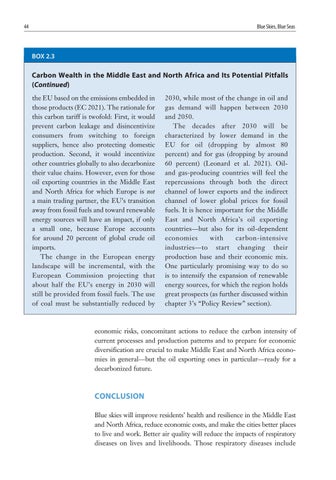44
Blue Skies, Blue Seas
BOX 2.3
Carbon Wealth in the Middle East and North Africa and Its Potential Pitfalls (Continued) the EU based on the emissions embedded in those products (EC 2021). The rationale for this carbon tariff is twofold: First, it would prevent carbon leakage and disincentivize consumers from switching to foreign suppliers, hence also protecting domestic production. Second, it would incentivize other countries globally to also decarbonize their value chains. However, even for those oil exporting countries in the Middle East and North Africa for which Europe is not a main trading partner, the EU’s transition away from fossil fuels and toward renewable energy sources will have an impact, if only a small one, because Europe accounts for around 20 percent of global crude oil imports. The change in the European energy landscape will be incremental, with the European Commission projecting that about half the EU’s energy in 2030 will still be provided from fossil fuels. The use of coal must be substantially reduced by
2030, while most of the change in oil and gas demand will happen between 2030 and 2050. The decades after 2030 will be characterized by lower demand in the EU for oil (dropping by almost 80 percent) and for gas (dropping by around 60 percent) (Leonard et al. 2021). Oiland gas-producing countries will feel the repercussions through both the direct channel of lower exports and the indirect channel of lower global prices for fossil fuels. It is hence important for the Middle East and North Africa’s oil exporting countries—but also for its oil-dependent economies with carbon-intensive industries—to start changing their production base and their economic mix. One particularly promising way to do so is to intensify the expansion of renewable energy sources, for which the region holds great prospects (as further discussed within chapter 3’s “Policy Review” section).
economic risks, concomitant actions to reduce the carbon intensity of current processes and production patterns and to prepare for economic diversification are crucial to make Middle East and North Africa economies in general—but the oil exporting ones in particular—ready for a decarbonized future.
CONCLUSION Blue skies will improve residents’ health and resilience in the Middle East and North Africa, reduce economic costs, and make the cities better places to live and work. Better air quality will reduce the impacts of respiratory diseases on lives and livelihoods. Those respiratory diseases include






